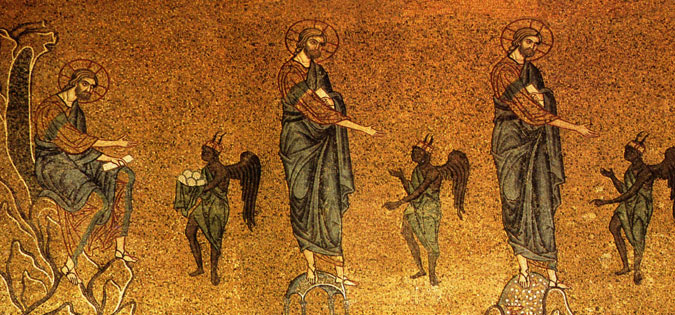 Each week of Lent, we’ll provide an Ignatian prayer for you, inspired by a video from Arts & Faith: Lent. The video and prayer for the First Week of Lent, Cycle B, are based on Mark 1:12–15. The art is “The Temptation of Christ” from the Basilica of St. Mark, Venice.
Each week of Lent, we’ll provide an Ignatian prayer for you, inspired by a video from Arts & Faith: Lent. The video and prayer for the First Week of Lent, Cycle B, are based on Mark 1:12–15. The art is “The Temptation of Christ” from the Basilica of St. Mark, Venice.
“And a voice came from heaven, ‘You are my Son, the Beloved; with you I am well pleased.’
“And the Spirit immediately drove him out into the wilderness. He was in the wilderness for forty days, tempted by Satan; and he was with the wild beasts; and the angels waited on him.”
—Mark 1:11–13
Preparation
The union in openness of body and mind and heart that is prayer begins with attention to each.
First your body: Sit upright, legs crossed or not, feet on the floor or not, lower back pressed against the chair. Or not. Breathe.
Now the mind: As you are able, let these words spill through the mind and down your spine into the earth. Let your thoughts puff away with each breath. As new ones come—knotted as they are with joy or pain—hold them like wounded birds. Set them aside to heal. Breathe.
And the heart: Vulnerability means able to be wounded. Of course there is resistance. Notice it. With your breath, and with energy, pull back the vines and push open your heartgate. Breathe.
Tilt your chin up to the heavens and, with eyes open or closed, look back at the One who looks at you with great affection.
Breathe.
Temptation and the Two Standards
It is not possible to imagine, in the Ignatian way, without first noticing. So notice, first, what it is like to look on the gold tiles, the royal desert in which the Enemy confronts the Friend.
- What do you notice as you look at the mosaic? The rounded white edges of the bread? The dialogue of open hands? The trio of accompanying angels?
- What do you notice? Where are you drawn and to whom?
- What feelings begin to tunnel their way to the surface of your attention?
While noticing, let yourself remember that this confrontation comes only after the baptism of Jesus. For him, being tempted only happens after he has been told incontrovertibly of his belovedness, which he has been submerged in and accepted. Notice whether it is into the desert of acceptance that the Spirit drives you.
- When is the last time you felt yourself named “beloved”?
- Was it easy to assent to? Did you hold a part of yourself in reserve?
- Do you want to be named the beloved?
- Can you speak to the Lord about what you want?
The story the mosaic tells is a simple one. But despite its simplicity, asking how our lives tell this story too is an uncomfortable thing, because it means noticing how we are tempted.
St. Ignatius asks us, in the famous Two Standards meditation of the Spiritual Exercises, to imagine our friend Jesus and the Enemy of Our Human Nature instructing their followers how to behave in this world. The Enemy, says Ignatius, says to all the same thing he says to Jesus: we ought to move from the desire for riches (of any kind) to honor to pride, thus sealing off a person from openness to God.
- What is the bread, the riches, you are offered that leads you into feeling honored by what you possess?
- Do you say yes to them? What does that yes lead to?
- Can you notice any honors given you that lead you to self-celebration and self-reliance?
- What happens when you turn inward rather than outward in praise of the Giver of good gifts?
- What does it feel like to be proud of being honored and having much? What does it do to you?
- Do you notice any resistance, any uncomfortability with such sensations? Can you follow this resistance back into the life of vulnerability and dependence?
Our friend Jesus, says Ignatius, teaches us to resist as he did, moving instead from poverty to acceptance of humiliations and so into humility and dependence on God—all originating from having been immersed in an endless love.
Humility means self-acceptance. Self-acceptance means acceptance of dependence.
- What is it like to say no to bread and riches, to assurance of success, to the smoother path to victory?
- What is it like to resist? When and where in your life have you done so?
- What is it like to feel the grace of being poor rather than rich?
- What is it like to try to accept and celebrate your dependence?
- How does the hard gift of humility feel?
- Do you want it? What do you want?
Lastly remember the accompanying angels.
- Who are the angels in your life that minister to you in your temptations?
- To whom do you go when you need to be cared for and held close? Before whom can you be unpolished or disassembled?
Speak with our great Friend about what you have noticed and imagined. Speak as one friend speaks to another.
Concluding Prayer
Glory be to the Father,
and to the Son,
and to the Holy Spirit.
As it was in the beginning,
is now, and ever shall be,
world without end.
Amen.

First exposure to this progra. Love the combination of Art, the piercing questions and St. Ignatius . Thanks